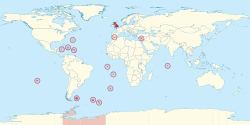British Dependent Territories
|
British Overseas Territories
|
|
|---|---|

Location of the United Kingdom and the British Overseas Territories
|
|
| Largest settlements | George Town, Gibraltar, Road Town |
| Official language | English |
| Demonym | British, Briton |
| Territories |
|
| Leaders | |
|
• Monarch
|
Elizabeth II |
| Boris Johnson | |
|
• Minister of State
|
Tariq Ahmad |
|
• Minister of State
|
Alan Duncan |
| Area | |
|
• Total
|
1,727,570 km2 (667,020 sq mi) |
| Population | |
|
• 2010 estimate
|
250,000 |
| Date format | dd/mm/yyyy (AD) |
| British Overseas Territories Joint Ministerial Council | |
|---|---|
| Type | |
| Type |
Dialogue forum
|
| Seats | 28-30 |
| Elections | |
| All members elected either as MPs in the UK cabinet or as heads of Government or Ministers in Overseas Territories. | |
| Meeting place | |
| Westminster, London | |
| Website | |
| www |
|
The British Overseas Territories (BOT) or alternatively, United Kingdom's Overseas Territories (UKOTs), are 14 territories under the jurisdiction and sovereignty of the United Kingdom. They are the parts of the British Empire that have not been granted independence or have voted to remain British territories. These territories do not form part of the United Kingdom and, with the exception of Gibraltar, are not part of the European Union. Most of the inhabited territories are internally self-governing, with the UK retaining responsibility for defence and foreign relations. The rest are either uninhabited or have a transitory population of military or scientific personnel. They share the British monarch (Elizabeth II) as head of state.
The term "British Overseas Territory" was introduced by the British Overseas Territories Act 2002, replacing the term British Dependent Territory, introduced by the British Nationality Act 1981. Prior to 1 January 1983, the territories were officially referred to as British Crown Colonies. With the exceptions of the British Antarctic Territory and South Georgia and the South Sandwich Islands (which host only officials and research station staff) and the British Indian Ocean Territory (used as a military base), the Territories retain permanent civilian populations. Permanent residency for the 7,000 or so civilians living in the Sovereign Base Areas of Akrotiri and Dhekelia is limited to citizens of the Republic of Cyprus.
Collectively, the Territories encompass a population of about 250,000 people and a land area of about 1,727,570 square kilometres (667,020 sq mi). The vast majority of this land area, 1,700,000 square kilometres (660,000 sq mi), constitutes the almost uninhabited British Antarctic Territory, while the largest territory by population, Bermuda, accounts for almost a quarter of the total BOT population. At the other end of the scale, three territories have no civilian population; the Antarctic territory, the British Indian Ocean Territory (from which the Chagos Islanders were controversially removed) and South Georgia. Pitcairn Islands, settled by the survivors of the Mutiny on the Bounty, is the smallest settled territory with 49 inhabitants, while the smallest by land area is Gibraltar on the southern tip of the Iberian peninsula. The United Kingdom participates in the Antarctic Treaty System and, as part of a mutual agreement, the British Antarctic Territory is recognised by four of the six other sovereign nations making claims to Antarctic territory.
...
Wikipedia

